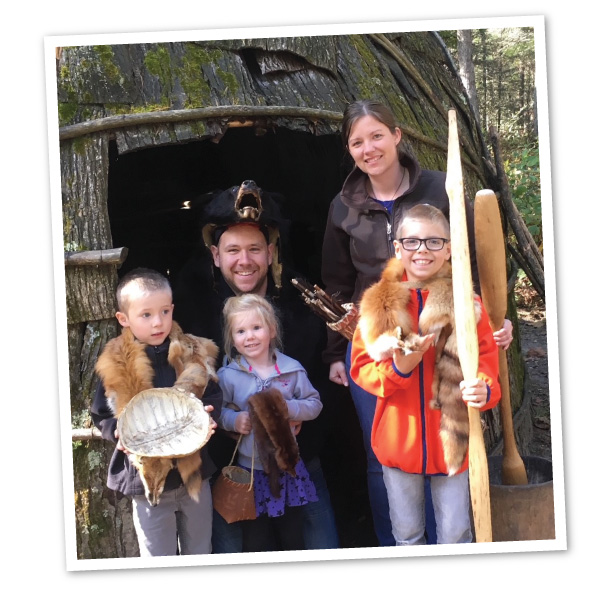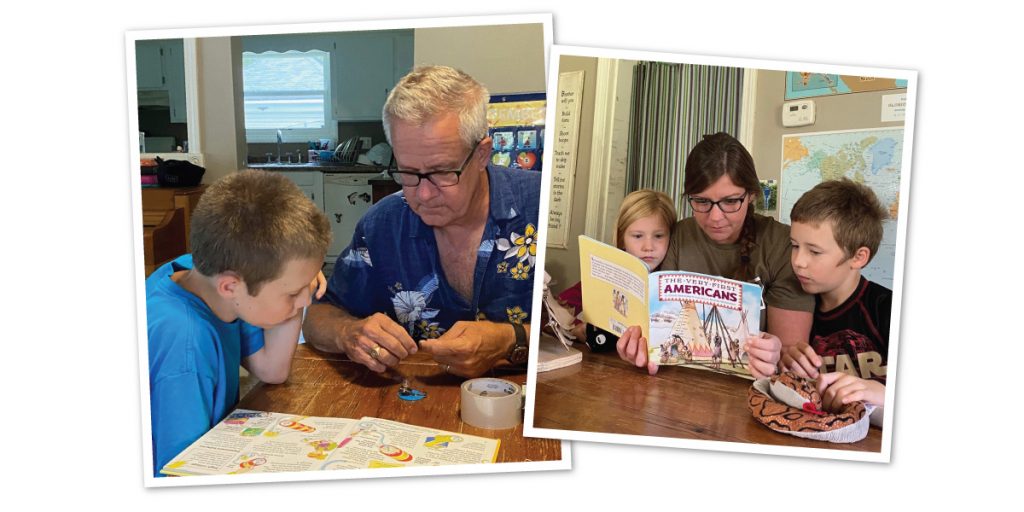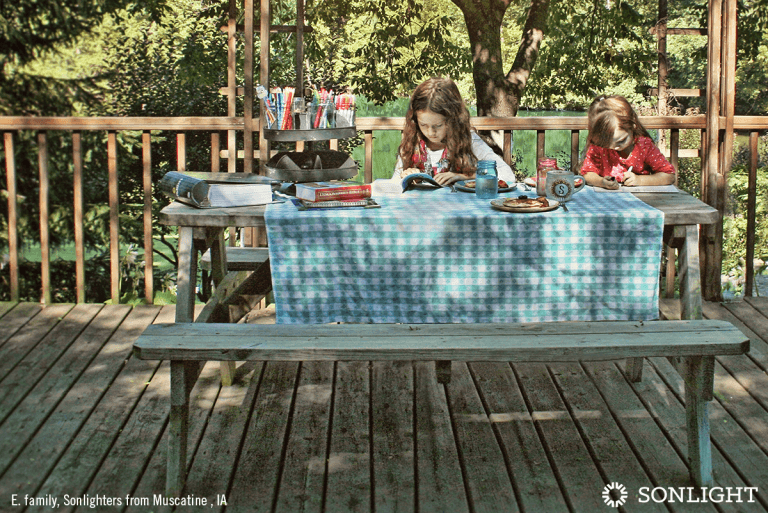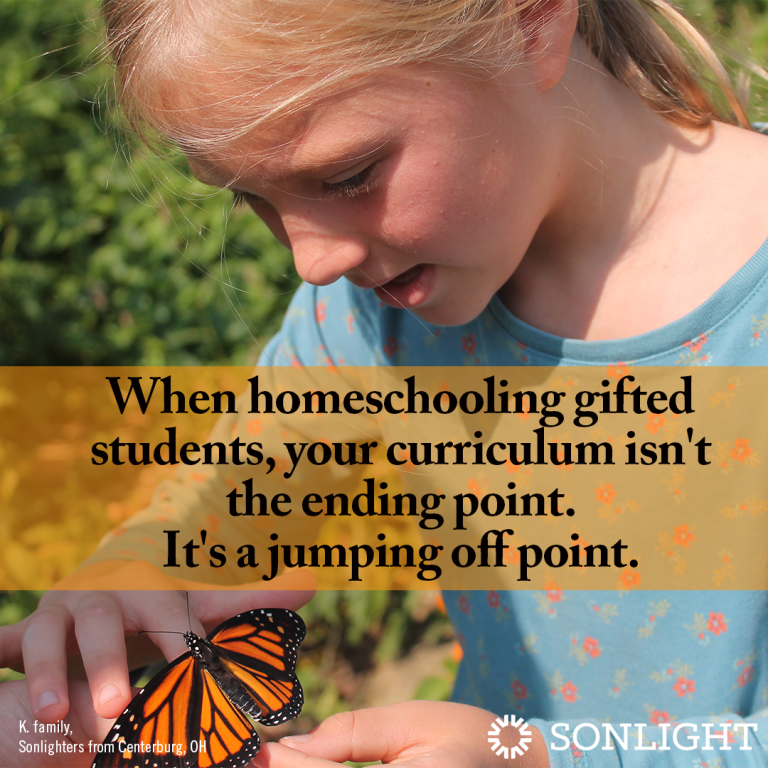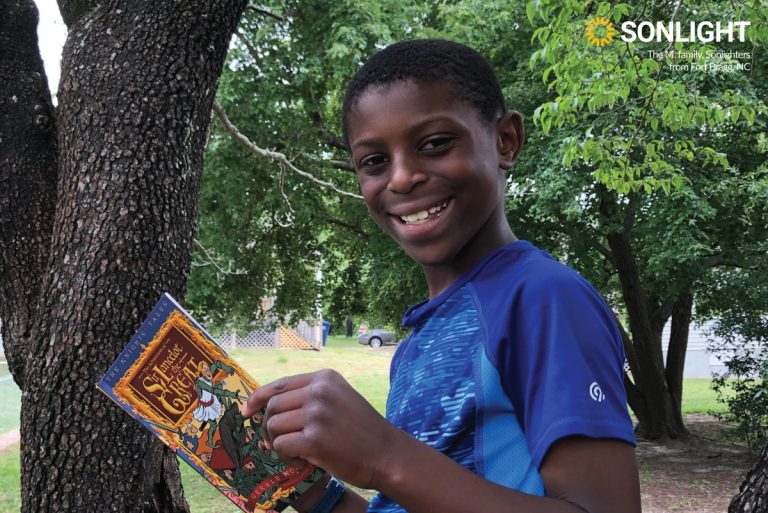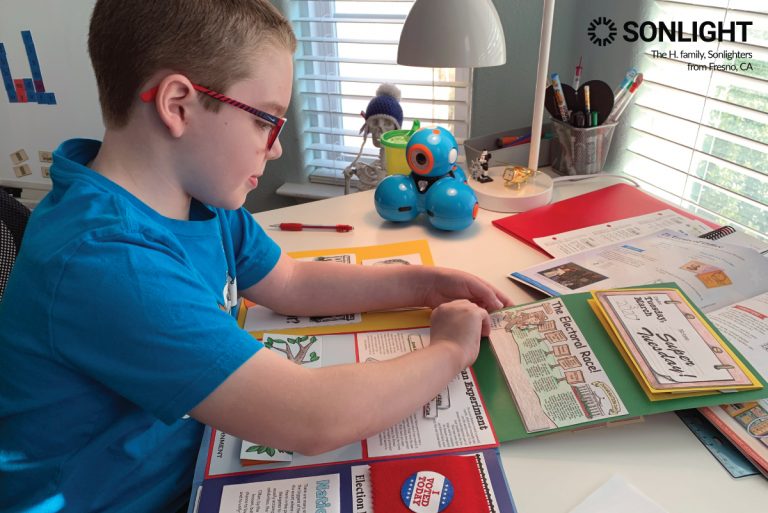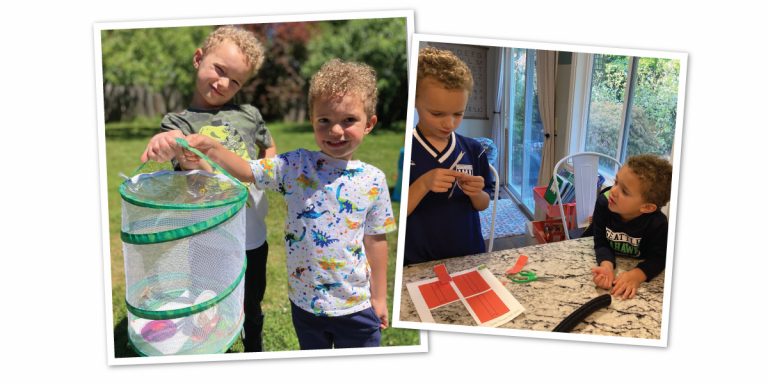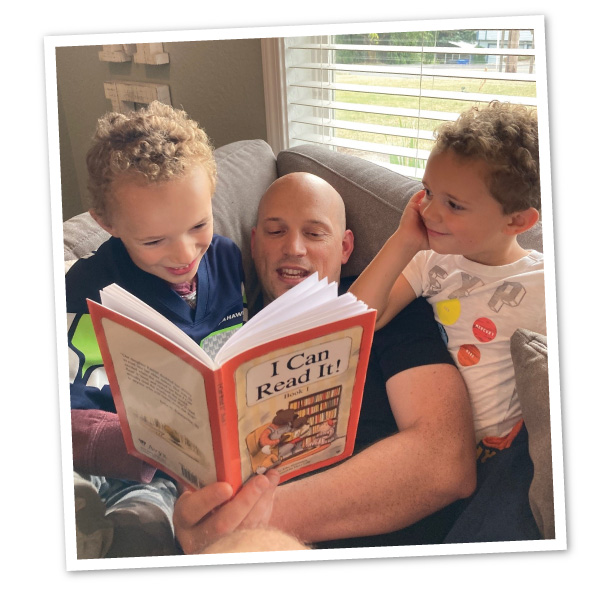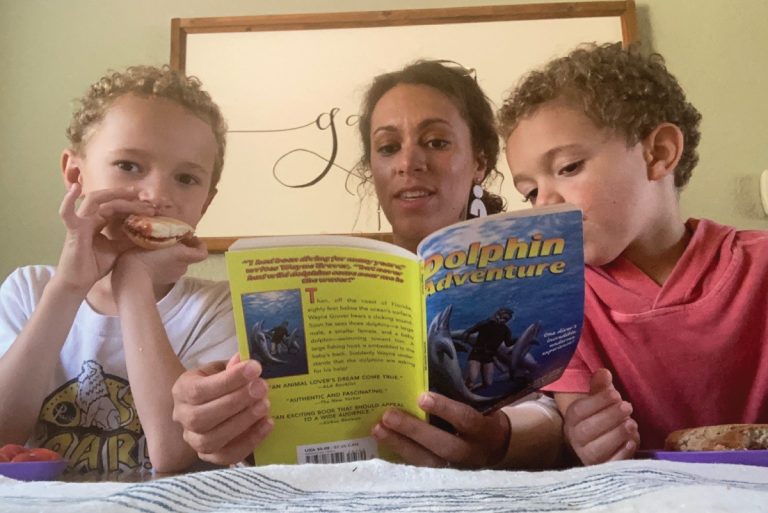Rosie, age 9, loves reading in creative, outdoor places!
“[Rosie] is a gifted learner and thrives on the challenging and also inviting Sonlight curriculum choices. Yesterday she wanted to schedule time to finish every single lesson in her 3rd grade LA, and my husband was amazed (and delighted, too). I am thrilled to have a curriculum I can trust to challenge my gifted learner: heart, mind, and soul. Thank you, Sonlight, for your part in creating a lifelong reader and learner! We are excited to be Sonlighting again next year at Rosie's request.”
Valerie M. of North Fairfield, OH
How do you homeschool accelerated learners? How do you keep pace as they zoom through books? How do you meet their thirst for knowledge? A homeschool mom emailed me recently to ask these questions. Though I don't know the particulars of her very bright daughter, based on my own years of experience, I can share nine tips for homeschooling gifted students.
Tip #1: Use a Curriculum as Your Foundation
If you're of the unschooling persuasion, you'll probably disagree with me here, and that's okay. But I firmly believe that you can best help your children by using some sort of curriculum as the foundation of your homeschool.
My own learning in school came in unrelated snippets. One week we studied the pilgrims. Then we moved to ancient China. Then we studied space. I never learned the big-picture of history and how the world works until I pieced it all together on my own and kept on learning as an adult.
Using a history-based curriculum (like Sonlight) gives your children the framework of knowledge they need. As you move through time, you give them a cohesive map of knowledge they will build on their entire lives. As they learn new information, they can place that knowledge in the appropriate place in their mental map.
For example, if your child becomes fascinated with Ancient Egypt, that interest will pay off all the more because they'll be able to place what they learn within the general framework of history. They'll know when Egyptian kingdoms came onto the world scene and how they influenced the cultures around them.
Without a curriculum, students don't gain this mental map of knowledge.
They learn in bits and pieces and only fit it all together if they're lucky (or if mom exhausts herself creating her own program to fit everything together).
A curriculum keeps you on track and makes sure your children learn the important things they need to. The big-picture doesn't get lost in their detailed curiosity about butterflies or the engineering principles of Egyptian pyramids.
But here's the catch:
The curriculum isn't the ending point. For gifted learners, curriculum is merely a jumping off point.
Just Getting Started as a Homeschooler?
If you’re just starting to homeschool with a precocious 4- or 5-year-old, be sure to read The Grade Level Dilemma for Gifted Kids Just Starting School. It will help you choose a good fitting curriculum.
If you're a brand new homeschooler with a child at any level, be sure to visit here: Homeschooling Resources, Printables, FAQs: Tips for Getting Started.
Tip #2: Use a Literature-based Curriculum as Your Foundation
In the past twenty plus years, I've seen Sonlight's literature-based programs work splendidly for learners across the spectrum.
Why? Because one piece of literature (unlike one textbook) can speak to children at a variety of levels. Little ones can listen in to understand the general ideas while more advanced students can appreciate the nuances of the text and find connections with other concepts they've learned.
Literature-based curriculum provides the flexibility to speed up and slow down as best suits your family. It naturally leads students into all sorts of self-led learning. As you read Charlotte's Web, you can easily slow down and detour into learning about spiders. As you read Johnny Tremain, you can dive further into the intricacies of the American Revolution.
Furthermore, as one mom wrote, "Great literature is a hallmark of the truly educated mind." I agree. Literature provides the cultural literacy, vocabulary and global awareness children need. Even gifted kids need to learn empathy and develop emotional intelligence to interact with others (which reading can provide). Before they can learn to write, they need to learn the rhythm and flow of good writing by hearing good examples. They need to discover the joy of books as a lifelong source of new knowledge.
Even gifted children aren't born knowing all of this, but literature inherently teaches it.
The Case for Classic Literature
There is concrete evidence that being read to leads to success in school. Thus reading has been part of our family life from day one. I wanted to capture my children’s imagination early by reading my favorite books to them, so nap time was always reading time. I made reading a habit; I modeled it and made time for it.
I found that my gifted children especially benefited from the influence of stories about great people. Historical fiction and biographies are a beautiful way to fall in love with heroes every single day. Many of the characters in those books have quirky passions or were misunderstood for years before their unique way of thinking was finally appreciated. These themes help gifted learners come to grips with their unique talents and provide role models for guiding their own complex emotions.
I have built an amazing home library over the last thirteen years simply by using Sonlight curriculum. It turns out that in our family of ten children, there is not a single book that isn’t someone’s favorite.
Tip #3: Mix and Match
It’s common for gifted students to be asynchronous in their abilities and development. This means that while a gifted child may excel in many academic areas or skill sets, they may lag behind or be more typical in other areas.
For example, a gifted child could be a real whiz with math and science but struggle with reading. Or a child may be incredibly gifted with verbal skills but struggle with calculations and need more remediation in math.
To accommodate this assortment of high, average, and low abilities, you may need to forgo a rigid, grade-based all-in-one curriculum solution. Instead opt for a curriculum that allows customization. Sonlight All-Subjects Packages can be built with quite a few flexible choices, but if the choices aren’t wide enough for your gifted student’s asynchronicity, you can always mix and match subject by subject.
Lean on a Sonlight Advisor if you are unsure what is best for your particular child. Their advice is free and based on years of experience.
Tip #4: Go Broad: Add Extras
When homeschooling a gifted child, enjoy your accelerated freedom to explore the world around you. You'll know you're hitting what you need to because of the curriculum you use as your foundation. So enjoy some tangents and enrich that foundation!
As Deanna wrote, "Gifted kids are still kids, after all, and the world is an enormous place, with tons of different kinds of things to learn." If your children fly through their programs, enrich their studies with a broad spectrum of other topics.
For example, could you add any of these areas to your children's plate?
- foreign language Consider that the educated class of past eras often learned many languages as children and teenagers. I've heard that J. R.R. Tolkien knew at least twelve! Could you add Spanish, Russian, Mandarin, Arabic, Latin, Biblical Greek, Ancient Greek, Biblical Hebrew, sign language … or other languages that could prove useful?
Take your choice—any language offers brain building benefits. Studies show that learning a foreign language is a great way to build additional neural pathways in a child’s brain. Many gifted children will love the challenge that learning a second language offers. - computer programming
- electrical engineering
- music theory
- mechanical engineering
- (from fixing cars to designing machines)
- robotics
- creative writing
Encourage your child to write stories, plays and poetry, or participate in the NaNoWriMo Young Writers Program to help your child write her first novel.
Amber’s Story of Providing Bonus Studies
Here’s Amber’s story of how she grappled with a voracious learner who was quickly done with her curriculum each day but needed more to do.
My gifted daughter is an extremely rapid reader. There were days she would finish all of her reading assignments before lunch. She and I would go over the discussion questions in the IG, and sure enough, she could respond with satisfying answers.
I was at a loss. Can a kid be done with school by lunch? Is that even allowed?
I heaped on extra work, but she did not see the fairness in that. As a parent, I had to humbly admit it was not a good way to inspire her to love learning.
As a solution, I began introducing new subjects for student-led independent study. I would start the topic with a few key resources: a probing question, a video, a book, or a curriculum. Then she would follow the vein of interest as desired. In this manner, she delved into a wide swath of topics:
- oceanography
- geology
- herbs and medicinal plants
- photography
- robotics
- coding
- drawing
We continued this smorgasbord of electives until my daughter found her passion in writing. It took time to find an interest that captured her imagination, but all of the searches were worth their time and effort. No learning experience is ever wasted.
Tip #5: Use More Than One Program Per Subject when Homeschooling Gifted Students
Is your child flying through math? Deepen and broaden his understanding by using more than one math program at a time. I highly recommend Life of Fred for accelerated math students. It approaches math from a different perspective and helps students see the big picture. It's a great starting point or a fabulous addition to your current math regimen.
Enrich your Sonlight History / Bible / Literature (HBL) program with extra courses that go deeper into a particular subject. Check out The Teaching Company for lots of courses that examine particular eras or themes of history. (But please use discretion as you decide on courses; The Teaching Company courses are created for secular, adult learners.) Your HBL will keep you on track with the big-picture movement through history, and your extra courses will broaden your child's appreciation of specific ideas that catch their interest.
Encourage Gifted Kids to Go Deep
Amber shares her experience with going deep:
Instead of skimming over the same series of facts year after year, we focus on studying with increasing complexity each year — going deep. When a subject catches our attention, we stay in one place and get to know it. Gifted students are known to get engrossed in a subject that piques their interest. Let them go as deep as they want. To force them to move on just to follow a schedule or checklist crushes their passion for learning more.
By spending the whole school year in one place and time in history, year after year, our students built a cohesive mental timeline, gaining a deeper understanding of how and why historical events were happening. This depth helped me build an education for my kids that was far beyond the model of memorizing names and dates which most of us experienced in public school. Whether it was in-depth American History or our year spent studying the Eastern Hemisphere, having a full year meant we had time to fully explore and enjoy un-rushed learning.
Tip #6: Give Control of the Instructor's Guide Sooner
Amber provides more insights for teaching gifted children at home:
When homeschooling, the parent often takes more of a facilitator role, especially once students reach middle school. For example, Sonlight History / Bible / Literature Level F, teaches students to research independently, so children are able to work in a self-guided fashion, following the IG with a parent on tap for support.
For my gifted learners, however, I have learned to turn over the Instructor's Guide (IG) sooner, even before Level F. Giving my gifted kids power over their schedules led to some curious choices. My daughter, for example, chose to read most of her books all of the way through instead of following the schedule which spaced the reading over a period of weeks. My son chose to hunker down with math, doing a high volume of lessons each day instead of following the steady drip of one lesson per day as prescribed in the curriculum outline.
When giving control of the IG to my gifted children, I still check in with them regularly, but I found two massive benefits with this self-pacing:
- My gifted kids stayed enthusiastic about their learning.
- They were given liberty to work at their preferred pace, one that was much faster than that of their siblings.
If you are homeschooling children in groups of two, three, or more, realize that your gifted children may need to diverge from your group plans so that they can zip ahead at a pace that's comfortable for them. Holding them back for the sake of the group can be demoralizing for them and crush their zeal for learning. Let them take control of the IG and work through it however they prefer.
Tip #7: Remember that Education Is More than Academics
With all students—including accelerated students—our role as parents is to guide them in much more than just academics. If your child is an accelerated learner, perhaps he can use some of that extra time to dive into projects that make a difference in your community or the world.
Is there a charitable project your child can participate in or even create and spearhead? Consider how you can help your child learn that life is more than knowledge and good grades! May all our children discover the joy of giving our time and talents to serve others.
And also, kids are kids. Help them enjoy the many other facets of life! Can they explore various sports, art forms, musical instruments, outdoor activities, entrepreneurship and more?
Tip #8: Consider a Gap Year for Gifted Students
Concerned that your child will finish high school early? Consider the benefits of a gap year before sending her off to college.
Just think of how much she could learn and serve during a year helping a missionary family overseas, serving with an international aid organization, or even volunteering in your home community. Many top colleges value the life experience such opportunities provide.
Tip #9: Find Community
I developed many of the ideas I shared in these two posts through 20+ years of working with homeschoolers. But the wise parents on the Accelerated Learners section of the (now defunct) Sonlight Forums helped me form more specific tips and advice.
To connect with other homeschool parents, download the Sonlight Connections app. You'll find a community where you can discuss academics as well as other aspects of parenting a gifted child, including self image, sibling rivalry, burnout, and more.
Making a homeschool plan for gifted students is challenging, just like educating any student. But following these nine road markers will help you devise a curriculum that overcomes many of the obstacles gifted children face in a regular classroom. As a bonus, you get to experience the deeply satisfying joy of being integral to your children’s learning! Homeschooling is the perfect model to help your gifted student excel, explore, and thrive.



